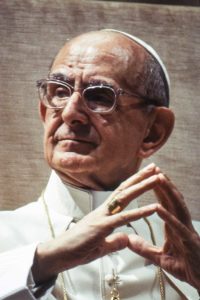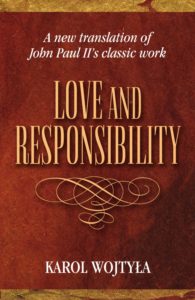
On the very day the encyclical was released in Rome, it was undermined. Fifty years on, the effects still hold of a scandalous incident. For reasons I still cannot determine, Mgr Ferdinando Lambruschini told the media that the teaching was “not infallible”. These words, apparently his own comment, did not appear in the report published in L’Osservatore Romano, but the damage was done. He had been in the Papal Commission and had signed the majority report. Picked up by the media, his words were interpreted by many people as a signal to ignore the papal teaching. The “logic” ran like this: “It’s not infallible so we can choose to reject it.”
Later, when I entered the seminary, I carefully studied the exact authority of the papal teaching, its “theological note”. I came to the opposite conclusion, that is, Humanae Vitae embodies infallible teaching. The writing of Dom Paul Nau on the Ordinary Magisterium was most helpful. But, in 1968, a recent convert did not know enough theology to understand that when a Pope repeats and elucidates constant Church teaching on faith or morals, then this is the infallible teaching of the Ordinary Magisterium. Humanae Vitae did not have to be proclaimed solemnly, like a dogma defined by the Extraordinary Magisterium.

What most of us did not know at the time was how a young Polish cardinal had influenced the way Paul VI presented the teaching. Karol Woytyla had written Love and Responsibility back in 1958. As Pope John Paul II he would later develop and enrich Humanae Vitae.
A Famous Debate
In 1968 I was at the public debate over the encyclical held in Oxford between some Dominican priests and Professor Elizabeth Anscombe. She defended Humanae Vitae logically and easily won the debate, not however in the opinion of many clergy, professors and students crowded into the Newman Rooms. Emotions counted more than reason at that time. She maintained a direct and challenging argument: if you accept contraceptive intercourse, logically you should accept same-sex activity.
She maintained a direct and challenging argument: if you accept contraceptive intercourse, logically you should accept same-sex activity
During that historical debate, John Finnis, a young Australian postgraduate student, stood up and quoted footnote 9 in the encyclical, St Thomas Aquinas on the Natural Law. The Dominicans were most embarrassed! At that time, some English members of this great Order had absorbed Marxism. Later, in a pub, I heard a priest of this faction cynically describe Humanae Vitae as an opportunity to engage in power struggles in the Church.
That incident also revealed another problem, how using dissent against the papal teaching became an instrument to achieve the radical goals of what Pope Benedict XVI calls “the hermeneutic of discontinuity” or rupture. Let me add that the English Dominicans today have moved well beyond that unfortunate phase in their history.
